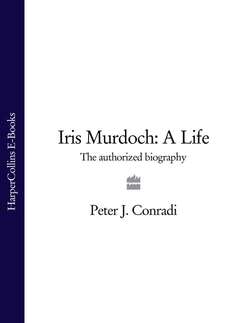Читать книгу Iris Murdoch: A Life: The Authorized Biography - Peter Conradi J. - Страница 46
4
ОглавлениеFraenkel haunts Iris’s novels. The dedicatee of The Time of the Angels, he lies behind the magisterial and dying Levquist in The Book and the Brotherhood, and behind Max Lejour in the earlier The Unicorn, who movingly sings to a ‘plain-song lilt of his own’ a chorus from Aeschylus’ Agamemnon, while his old pupil listens to the ‘healing familiar lines':
Zeus, who leads men into the ways of understanding, has established the rule that we must learn by suffering. As sad care, with memories of pain, comes dropping upon the heart in sleep, so even against our wills does wisdom come upon us.50
Here Aeschylus’ crucial Hymn to Zeus is a key to the novel’s gainsaying of the liberal-humanist illusion that life can (or should) have to do only with the pursuits of happiness and ‘freedom’. On the contrary, only those who are positively wounded51 –if not corrupted by the experience – have the chance of learning wisdom ('suffering teaches,’ Iris wrote in 194552). Moreover, in her Platonic dialogue Art and Eros Callistos tries to recite a different translation of the same hymn throughout, succeeding in being heard only in the play’s culminating moments. Here Callistos is putting on show a high-point of literary art, and disturbing, moving and infuriating Plato – who is ‘anti-art’ – with the ‘terrible beauty’ of the Hymn to Zeus.
In the commentary to the Agamemnon he finally published, the fruit of twenty-five years’ labour disrupted by exile, the most detailed commentary ever devoted to a Greek classic, Fraenkel writes that in the Hymn to Zeus ‘ [Aeschylus] endeavours in a sublime effort to unriddle the ultimate cause of the fate and suffering of man.’53 He identifies the views of the chorus with those of Aeschylus, being obsessed by the theology of Agamemnon’s guilt. It is noteworthy that Iris wrote of the lines as ‘healing’. Not all suffering was amenable to Socialist ‘correction’. Much is built into the very conditions of life, and the Party offered ‘too obtuse and partial an explanation of the world’s evil and of human goodness’.54
Probably Fraenkel also found in the play a grand key to the general drama being acted out in Europe at that time, a magisterial exploration of the themes of evil and implacable divine justice, a commentary on the bitter roots of all suffering, including his own.* Perhaps he saw human affairs as simpler and more dramatic than they actually were – seeing his friends, for example, as endowed with vices or virtues,55 seeing Agamemnon as a ‘gentleman’. If Fraenkel gives, either here or in his work on Horace, a sentimental or false picture of the relationship between poetry and politics,56 this was a simplicity Iris shared, to the enrichment of her own work.
Iris’s later poem about Fraenkel’s seminar, ‘The Agamemnon Class, 1939’ (1977), is remarkable for its deliberate conflation of different kinds of dread: of the war; of being unable correctly to identify the tenses of some familiar verb; and what might be termed moral dread, the deep fears that can accompany the awakening of an acute adult moral consciousness. She also conflates two kinds of heroism, ancient and modern, Greek and twentieth-century British. The long poem, dedicated to Frank Thompson’s memory, starts thus:
Do you remember Professor
Eduard Fraenkel’s endless
Class on the Agamemnon? Between line eighty three and line a thousand It seemed to us our innocence Was lost, our youth laid waste, In that pellucid unforgiving air,
The aftermath experienced before,
Focused by dread into a lurid flicker,
A most uncanny composite of sun and rain.
Did we expect the war? What did we fear?
First love’s incinerating crippling flame,
Or that it would appear
In public that we could not name
The Aorist of some familiar verb.
The spirit’s failure we knew nothing of,
Nothing really of sin and of pain,
The work of the knife and the axe,
How absolute death is,
Betrayal of lover and friend,
Of egotism the veiled crux,
Mistaking still for guilt
The anxiety of a child.
With exquisite dressage
We ruled a chaste soul.
They had not yet made an end
Of the returning hero.
The demons that travelled with us
Were still smiling in their sleep …
Mary Warnock, who joined Fraenkel’s seminar in 1942, pleased Iris by commenting on the poem: ‘that atmosphere of dread and apprehension brought it all back to me. One dread merging into another. How amazing.’57 Frank, too, who may have attended the seminar in the summer of 1939,* believed Agamemnon the greatest drama yet written,58 and wrote an Aeschylean chorus comparing the Trojan to the Second World War, in both of which ‘boys died bravely, in a war of others’ making’.59 To his brother E.P. he refers, albeit within a joke, to ‘suffering as stark and Aeschylean as any I have known in this war’.60
